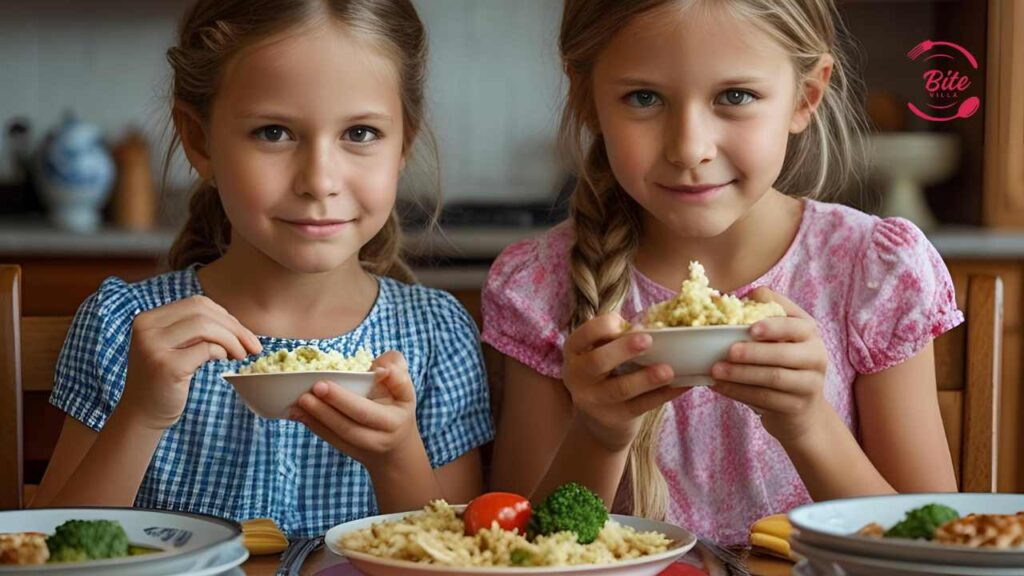Wondering why kids hate dinner? You’re not on my own—many dad and mom face dinner struggles with youngsters almost each night. It’s irritating when youngsters refuse to eat once you’ve hung out making a healthy own family dinner. Some choosy eaters shy away because the meals presentation isn’t appealing or the flavors seem too sturdy. Others dislike meals textures or avoid new ingredients altogether.
Sometimes, kids hate consuming at night because they’re worn-out, distracted, or already complete from snacks.Even the smallest detail, like meals touching at the plate, can reason court cases. Understanding these common dinner troubles is the first step to turning circle of relatives mealtimes from traumatic to exciting. With the right approach, you can make dinners greater appealing, encourage youngsters to try exclusive meals, and sooner or later create non violent, strain-unfastened mealtimes.
The dinner desk need to be an area of smiles, no longer sighs.” — Family Mealtime Principle
Understanding Why Kids Dislike Dinner
When mother and father ask why youngsters hate dinner, the answers aren’t always easy. Sometimes, picky eaters reject a meal due to the fact the meals textures experience atypical or the flavors are too strong. For some children, meals touching at the plate can immediately break their urge for food. Others dislike trying new meals because they sense more secure sticking to what they recognize.
Timing additionally plays a position—if kids snack too much before dinner, they arrive at the table complete and uninterested. Even circle of relatives dinner guidelines like sitting too long can make kids dread mealtimes. Understanding these styles allows you notice what’s truly at the back of the dinner battles. Once you realize the reason, you could make changes that help youngsters enjoy dinner, discover new tastes, and flip the ones stressful own family dinners into satisfied moments every body looks ahead to.
| Trigger | Why This Matters | Quick Fix |
| Food textures | Some feel too slimy, mushy, or rough | Offer crunchy or familiar textures |
| Strong flavors | Spicy or bitter flavors can be too strong for kids.Ask ChatGPT | Serve mild versions first |
| Food touching | Visual discomfort reduces appetite | Use divided plates |
| Full from snacks | No hunger left for dinner | Limit snacks before meals |
| Tense atmosphere | Stress reduces willingness to eat | Keep conversations light |
Common Reasons Why Kids Reject Dinner
When mother and father surprise why kids hate dinner, it regularly begins with choosy consuming conduct that broaden over the years. Some youngsters refuse dinner due to the fact the meals textures sense incorrect or the taste isn’t what they anticipate. If ingredients contact at the plate, many youngsters right away push it away. Trying new foods can feel scary, in order that they persist with favorites.
Sometimes youngsters snack an excessive amount of earlier than dinner, leaving no room for a meal. Even own family dinner policies like finishing the whole thing at the plate can create pressure. And when kids dread mealtimes, they connect dinner with stress instead of fun. Spotting these reasons early helps parents adjust, so kids enjoy dinner and mealtime becomes a happier family routine.
Kids may forget the taste, but they remember how dinner made them feel.” — Positive Parenting Reminder

The Role of Food Preferences and Sensory Issues
One big reason why kids hate dinner is because kids refuse dinner when the meal doesn’t match their food preferences. Some children have picky eating habits linked to strong sensory reactions—certain food textures feel strange or even upsetting. When foods contact at the plate, it could trigger immediately rejection.
Many children avoid attempting new foods due to the fact strange smells, hues, or shapes feel overwhelming. These choosy ingesting behavior can grow if dad and mom don’t address them early. Creating food with separate sections, moderate flavors, and familiar objects can assist. The aim is to make kids revel in dinner by means of respecting their consolation quarter while slowly introducing range, so youngsters dread mealtimes less and sense secure exploring new tastes.
| Sensory Factor | Example Reaction | Helpful Adjustment |
| Texture | Refuses mushy vegetables | Offer roasted or crunchy versions |
| Smell | Rejects strong fish odor | Use mild seasoning or lemon |
| Color | Avoids “green” foods | Mix with colorful vegetables |
| Combination | Won’t eat mixed foods | Serve components separately |
The Impact of Mealtime Pressure and Family Dynamics
Sometimes why kids hate dinner comes down to mealtime stress. When children refuse dinner, dad and mom often push them to devour, which could make picky ingesting habits worse. Constantly insisting that they “clean the plate” can flip dinner time into a struggle. If youngsters dread mealtimes, it’s often because the atmosphere feels worrying, not relaxed. Trying new ingredients underneath stress rarely works—youngsters want preference and manage.Family arguments at dinner time can also make children tune out and avoid eating. To help kids enjoy dinner, keep conversation light, avoid forcing bites, and make mealtime about connection. When food preferences are respected, kids refuse dinner less, and the whole family can enjoy eating together without stress.
“Pressure at the table creates barriers, not hunger.” — Mindful Eating Tip
Common Mistakes Parents Make at Dinner
Many times, why kids hate dinner has more to do with parent mistakes than the food itself.When youngsters refuse dinner, a few mother and father bribe with dessert, which teaches picky eating behavior. Others pressure trying new meals with out giving kids time to modify, which makes meal time annoying. Ignoring meals possibilities or serving handiest grownup-fashion meals can motive children to dread mealtimes.
Sometimes parents speak approximately weight or evaluate siblings, which most effective increases mealtime strain. To help youngsters revel in dinner, provide small portions, let them select sides, and keep away from strength struggles. Respecting meals preferences makes kids refuse dinner less frequently, turning time for dinner into a moment the whole circle of relatives without a doubt appears forward to.
| Mistake | Why It Fails | Better Way |
| Bribing with dessert | Teaches food hierarchy (dessert is better) | Make all foods equal in value |
| Forcing new foods | Increases resistance | Offer small tastes without pressure |
| Ignoring preferences | Kids feel unheard | Include at least one familiar food |
| Talking about weight | Creates stress | Focus on energy and health |
Practical Tips for Making Dinner Enjoyable
If you surprise why kids hate dinner, start through making supper time amusing, not forced. When kids refuse dinner, contain them in cooking so that they experience excited about attempting new ingredients. Keep quantities small to avoid overwhelming choosy consuming conduct. Respect meals alternatives but gently introduce variety to make kids enjoy dinnerAvoid distractions like TV so dinner time feels like family connection. Let kids help set the table, choose a vegetable, or add their own toppings—this helps kids refuse dinner less often. Keep conversations light, skip lectures, and celebrate even small bites. Over time, these changes can turn why kids hate dinner into why kids look forward to mealtimes.
When kids laugh at the table, they eat at the table.” — Parenting Wisdom
Creating a Positive Dinner Atmosphere
When you think about why kids hate dinner, sometimes the problem isn’t the food—it’s the mood. IIf kids refuse dinner regularly, create a comfortable dinner time where no person feels compelled. Avoid arguments or grievance, as this will make picky ingesting conduct worse. Instead, awareness on making kids revel in dinner with laughter, tales, and reward for trying new matters. Respect meals preferences, however hold imparting small quantities of healthful options. Play gentle music or permit kids refuse dinner in a peaceful way without punishment. Over time, a warm, welcoming vibe can change why youngsters hate dinner into why youngsters love circle of relatives mealtimes, making meal time some thing each person looks forward to.
Encouraging Healthy Eating Without Pressure
When thinking about why children hate dinner, it’s clean that pressure regularly makes youngsters refuse dinner extra. If you want to interrupt picky eating habits, keep away from forcing bites or bribing. Instead, make meal time approximately choice—offer a selection so children enjoy dinner by means of choosing what they prefer.Honor food preferences while gradually introducing new foods.
Sometimes children refuse dinner because they sense controlled, so give them small duties like putting the table. Use effective talk, no longer lectures, to lessen why youngsters hate dinner emotions. Over time, these mild techniques flip choosy ingesting conduct into healthy ones and make supper time a satisfied, shared enjoy.
Choice is the name of the game component to wholesome consuming.” — Balanced Mealtime Insight
Involving Kids in Dinner Decisions
One reason why kids hate dinner is that they feel not noted of choices. If youngsters refuse dinner, try letting them assist plan the dinner menu. Involving them in grocery purchasing can reduce choosy eating conduct due to the fact they see how meals is selected. When children experience dinner they helped create, they sense proud.
Turn supper time into teamwork—ask what greens they need or let them choose the seasoning. Respect meals preferences however encourage small adjustments. This method no longer handiest solves why children hate dinner but additionally builds cooking talents. Over time, choosy ingesting conduct fade whilst supper time looks like a own family assignment, and youngsters start looking ahead to meals as opposed to warding off them.
Setting a Relaxed Dinner Atmosphere
Sometimes why youngsters hate dinner is certainly because supper time feels worrying. If kids refuse dinner, it may be because of loud arguments or stress to devour speedy. Creating a relaxed area facilitates lessen choosy eating behavior. Play smooth music and make meal time fun so kids experience dinner in place of rushing through it. Avoid forcing bites; this regularly makes choosy eating behavior worse. Respect food choices even as gently introducing new meals. A peaceful desk can turn why kids hate dinner into why youngsters revel in dinner. Over time, a comfortable habitual makes meal time some thing they sit up for, no longer something they are trying to bypass.
Involving Kids in Meal Planning
One big reason why children hate dinner is that they experience no manage over supper time. If children refuse dinner, allow them to assist pick food to reduce picky ingesting habits. Ask about their preferred flavors and food possibilities so they sense heard. Involving them in grocery shopping makes kids revel in dinner because they picked the elements. You can talk balanced food at the same time as nonetheless respecting picky eating conduct. Even small selections—like picking greens—assist remedy why kids hate dinner. When they help plan, dinner time will become thrilling, not a combat. This easy step turns children refuse dinner moments into satisfied kids revel in dinner recollections.
Frequently Asked Questions
Why do youngsters refuse dinner even when they’re hungry?
Kids frequently snack an excessive amount of before dinner, dislike sure textures, or experience pressured. Timing, meals alternatives, and mealtime surroundings all play a role in refusal.
How can I prevent choosy ingesting at dinner?
Offer small portions, understand choices, and introduce new meals slowly.Avoid pressure or bribing—high-quality, calm mealtimes inspire kids to strive surprising dishes willingly.
Does mealtime strain make kids consume less?
Yes, forcing bites or insisting on easy plates can backfire. Pressure will increase resistance, making kids accomplice dinner with pressure as opposed to amusement.
What function do snacks play in dinner refusal?
Snacks too near dinner fill children up. Limit snacks at least one to 2 hours earlier than mealtime to ensure wholesome appetites.
How do sensory problems have an effect on dinner conduct?
Certain textures, smells, or meals mixtures can overwhelm youngsters. Separating foods, providing slight flavors, and respecting possibilities assist lessen sensory-related dinner refusals.
How can I make dinner extra fun for kids?
Involve kids in cooking, allow them to choose toppings or facets, and preserve conversations mild. Fun reports make trying new meals simpler.
Should I cook dinner separate meals for choosy eaters?
Not always. Offer one own family meal with small modifications—like separate sauces—to recognize possibilities at the same time as nevertheless encouraging range without extra cooking strain.
How can I contain kids in meal planning?
Let them pick vegetables, assist create menus, or join grocery shopping. Involvement boosts pleasure, reduces refusals, and encourages more healthy meals selections.
How do circle of relatives arguments have an effect on dinner?
Tense conversations or conflicts on the desk could make kids companion dinner with negativity. Calm, friendly atmospheres assist them relax and eat higher.
What’s the quickest manner to enhance time for dinner?
Remove distractions, serve balanced food, admire preferences, and create a comfortable temper. Consistency quick changes mealtime from annoying to exciting.
Conclusion
Understanding why kids hate dinner is step one to solving mealtime struggles. Whether it’s choosy consuming behavior, distractions, or strain, there are simple ways to help kids revel in dinner.When the youth refuse to dinner, try to make the food laugh, calm and tasty. Encourage, do not press and offer variations so that food preferences can increase.
Remember, dinner time have to be approximately connection, now not simply ingesting. By developing a heat surroundings, involving children in cooking, and respecting their alternatives, you could lessen choosy eating conduct and turn why children hate dinner into why kids love dinner. With patience and consistency, you’ll see youngsters revel in dinner greater frequently, making every dinner time a effective own family revel in.

Chef Elijah Jules is the Executive Sous Chef at Jade Mountain, St. Lucia, where he blends Caribbean flavors with modern culinary artistry. With a passion for local ingredients and refined technique, Chef Elijah crafts unforgettable dining experiences rooted in island culture and global inspiration

